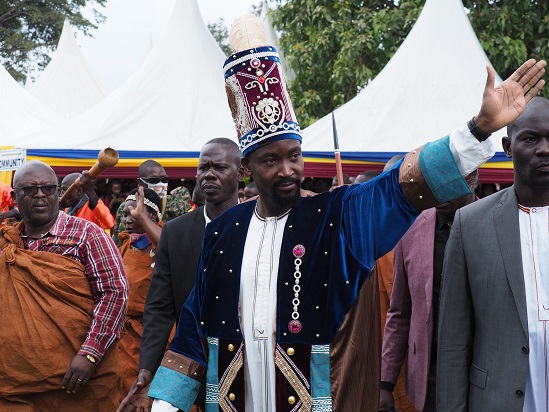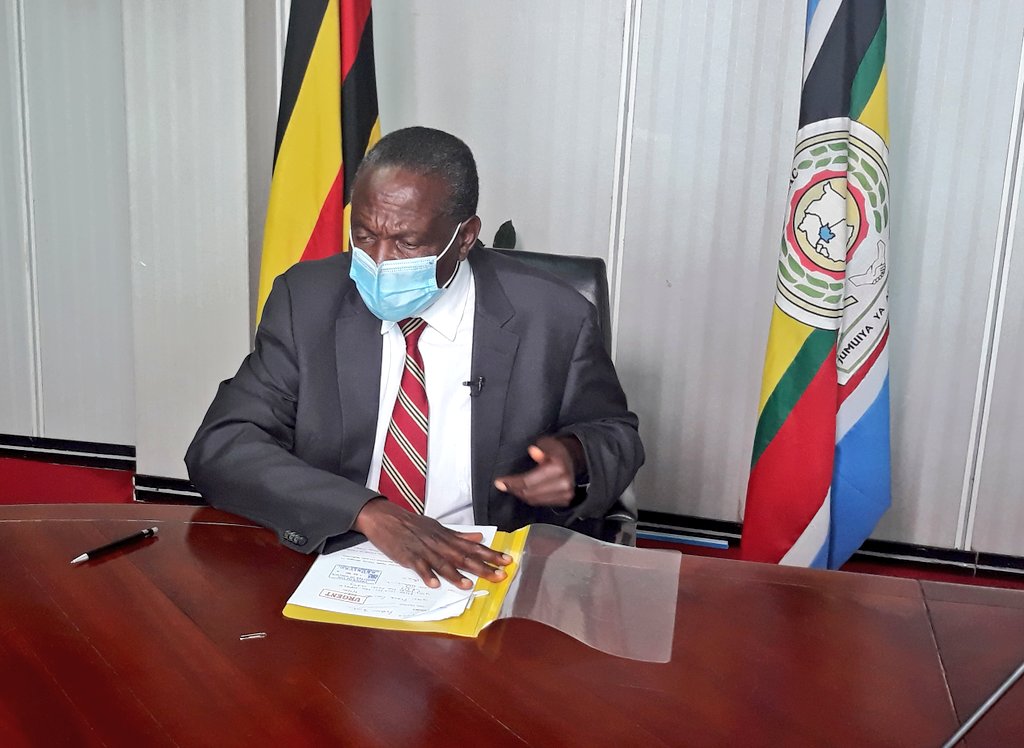Hamis Kigunddu (R) and his lawyer, Fred Muwema.
The Supreme Court in Kampala has ordered a fresh hearing in a case in which businessman Hamis Kiggundu is seeking to recover more than 120 billion Shillings from Diamond Trust Bank Uganda and Diamond Trust Bank Kenya.
Tuesday’s unanimous decision by five justices who include the Chief Justice Alfonse Owiny-Dollo, Lady Justices, Faith Mwondha, Percy Night Tuhaise, Justice Mike Chibita, and Stephen Musota arise from a series of legal proceedings initiated by Kiggundu and his two companies against Diamond Trust Bank (DTB) Uganda and DTB Kenya.
The case originated from a syndicated banking agreement between Kiggundu’s companies, Ham Enterprises Limited and Kiggs International Limited, and the two banks.
It all started after October 2020, when Commercial Court Judge Henry Peter Adonyo ruled in favor of Kiggundu, ordering DTB Uganda to refund all funds deducted from his accounts. It was alleged that these deductions were made without Kiggundu’s consent.
Records before the Court show that Kiggundu had obtained loans totaling over 120 billion Shillings from DTB Uganda and DTB Kenya between 2011 and 2016 to finance his real estate business.
The dispute arose when the banks claimed that Kiggundu had failed to fulfill his loan obligations, amounting to 39 billion Shillings, as per the agreed terms. They threatened to seize the mortgaged properties. Kiggundu petitioned the commercial court, arguing that the withdrawn funds exceeded the outstanding loan amount, as he had already made full repayment.
Represented by Fred Muwema, Kiggundu sought to strike out the banks’ defenses and obtain an order for the refund of unlawfully obtained funds. Justice Adonyo dismissed the banks’ defense and directed them to refund the money, along with an 8% interest rate and the costs of the suit.
But the banks through their lawyers led by Edwin Karugire sought relief from the Principal Judge, Dr. Flavian Zeija, who granted an order to stay the execution of Adonyo’s orders.
This prevented Kiggundu from recovering the funds. Subsequently, the banks appealed to the Court of Appeal.
In a subsequent ruling, the Court of Appeal overturned Judge Adonyo’s order and ordered a fresh hearing before a different judge.
Dissatisfied with this decision, Kiggundu lodged an appeal with the Supreme Court raising seven grounds key of them being that the Court of Appeal Justices erred in law and fact when they avoided adjudicating the substantial question of illegality which was the basis of the matter before them.
But in their judgment, the Supreme Court has agreed with Kiggundu partially that the Court of Appeal erred in law and fact when it failed to decide on the issue of illegality. It has gone into detail to determine it before forwarding the file for retrial.
The Justices have ruled that the type of financial transactions entered into between Diamond Trust Bank Uganda and Diamond Trust Bank Kenya is known as a syndicated loan facility which is known worldwide as a global lending phenomenon practiced by local and foreign banks and non–bank lenders.
According to the Supreme Court, this practice usually stems from the need to spread out, and thus reduce, the enormous risk associated with lending large sums of money, and individual countries may enact laws that place limits on the amount of money a bank can lend to a single borrower, thereby encouraging syndicated lending.
While quoting the Financial Institutions (Limits on Credit Concentration and Large Exposures) Regulations of 2005, the court has ruled that with these restrictions, large entities constantly look to foreign financial institutions, which may be banking or non–banking institutions, for syndicated credit facilities.
And as such, the relationship between the two banking institutions, and Kiggundu’s companies with regard to the financial credit transactions carried out between and amongst them, was neither governed by the Financial Institutions Act, 2004, as amended, nor the Financial Institutions (Agent Banking) Regulations, 2017.
However, they say that “in the syndicated agency relationship created between the 1st and 2nd Respondents as banking institutions, the rights and duties conferred on the 1st Respondent/Ham Enterprises Limited as the agent bank in the relationship between the two banking institutions, makes the 1st Respondent/DTB Uganda a fiduciary to the 2nd Respondent”.
They say this is because DTB Uganda is responsible for the disbursements of the funds from the DTB Kenya to the Kiggundu, holds the mortgaged loan securities in trust for the Kenyan bank, and follows up on the servicing of the loan by Kiggundu for remittance to DTB Kenya. As such, the Supreme Court has indicated that they didn’t see how this arrangement and the transactions that were carried out pursuant thereto could be taken to mean that DTB Kenya carried out financial institution business in Uganda as per the said explanation.
“Similarly, clause 4 of the 2018 agreement which provides for servicing of the credit facilities by the 1st Appellant/Ham Enterprises through its accounts with the 1st Respondent for remittance to the 2nd Respondent’s escrow account held by the 1st Respondent, are textually the same as the corresponding provisions in the 2017 agreement”, reads the judgment.
It adds that “it is clear from the terms of the contracts that DTB Kenya did not receive or hold any deposits in Uganda, and indeed it did not advance the impugned credit facilities to the Kiggundu and his companies out of any such deposits since it had no authority to carry out financial institution business in Uganda”.
Secondly, the Court indicated that DTB Kenya did not advance the credit facilities directly to Kiggundu as these were instead routed through the DTB Uganda, which is a bank duly licensed to carry out financial institution business in Uganda and which then disbursed the funds to the company. Furthermore, the Court has indicated that Ham Enterprises Limited did not service the loan facilities by payment directly to DTB Kenya but rather through DTB Uganda as an agent of DTB Kenya in a fiduciary relationship.
As such, the court has ordered for fresh hearing and made several orders saying, the amendment of the plaint, which introduced the claim of illegality as a cause of action, was proper in law and the syndicated credit–facility executed between the banks with the Ham Enterprises Limited as an agent of the DTB Kenya is lawful and neither the Financial Institutions Act of 2004, as amended, nor the Financial Institutions (Agent Banking) Regulations, apply to them.
“Accordingly, the claim impugning the legality of the credit facility contracts between the parties hereto is disallowed. The issue of illegality having been resolved in this appeal, High Court Civil Suit Number 43 of 2020, between the parties hereto, which was the genesis of the appeal to the Court of Appeal, and ultimately to this Court, is remitted back to the High Court for trial before another judge based only on issues of fact arising from the pleadings’, ordered the Court.
According to the Supreme Court, Kiggundu and his companies will pay the banks 50% of the costs in both the Supreme Court and the Court of Appeal.
The judgment was delivered in the absence of Kiggundu and his lawyer Muwema who has protested its delivery for having not been accorded a right to a fair hearing prior to the delivery of the judgment.
–URN





